This Carabao Cup semi-final second-leg could arguably not have come at a worse time for both Chelsea and Spurs. Chelsea had just lost to another bitter London rival, Arsenal, the previous weekend, going down 2-0 at the Emirates. Blues boss Maurizio Sarri questioned the motivation of his players following the league defeat and perhaps is struggling with a few of the egos within the Chelsea dressing room.
For Tottenham, even though they had won the first leg 1-0, a cup semi-final was the last game they wanted to play at this time given the absentees they had from their squad. Furthermore, Spurs boss Mauricio Pochettino has had to field a lot of questions about his failure to deliver silverware to North London given the team he has assembled over the past few years. Another loss at this stage would only serve to brighten that spotlight a little more.
Nevertheless, the great rivalry between these two old London clubs always guarantees a spectacle, especially in a cup semi-final. Fortunately, egos and injuries wouldn’t get in the way of what proved to be a very entertaining match, full of the passion and commitment expected for such an occasion.
Teams
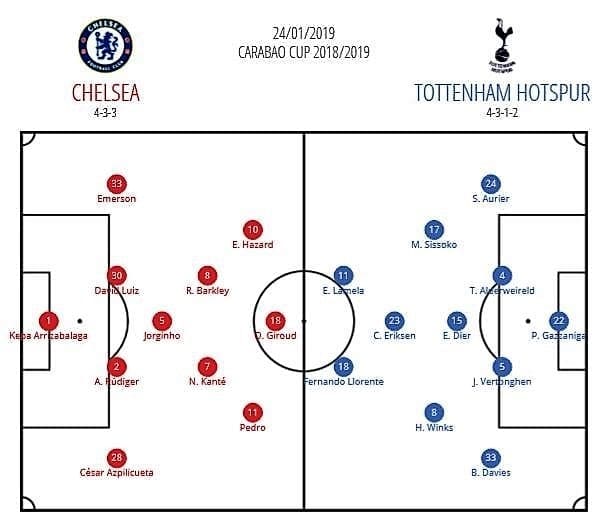
Maurizio Sarri has been heavily critiqued for how he has utilised his squad in recent months. Initially, many pundits and analysts could not understand Sarri’s positioning of both N’Golo Kanté and Eden Hazard, but the Italian was brought in to implement his philosophy. That’s what he’ll continue to do until his last day at the club.
However, it seems he is willing to bend slightly to get the best out of his Belgian superstar Hazard. With the arrival of striker Gonzalo Higuain from Juventus, Hazard will seemingly be moved back to his favoured left-wing position, as he was here. He was joined in attack by his preferred strike partner Olivier Giroud in the number nine role, with former Barcelona winger Pedro played wide on the right. Holding midfielder Jorginho and centre-back David Luiz are key to the Blues’ build-up play, since both are technically gifted individuals.
For Pochettino the situation was even less ideal. Key striker Harry Kane has been ruled out with injury for up to six weeks, as has goalscoring midfielder and big game specialist Dele Alli. To add to that, another regular starter and dynamic attacker, Son Heung-min, was away on international duty for South Korea.
Eric Dier was rushed back from illness and began the game in the holding midfield role. Ahead of him, Harry Winks and Moussa Sissoko have played a lot of football in recent months but would be given the box-to-box midfield roles in this game. Chief playmaker Christian Eriksen is the only fit regular attacker and started behind a front pairing of Erik Lamela and Fernando Llorente.
Square pegs in round holes
Pochettino prefers his side to dominate possession when they can. Spurs are typically patient in their build-up play, looking to keep hold of the ball as they move their pieces into position. It was no different from the norm at the beginning of this match as Spurs looked to get their full-backs into advanced, wide positions. Playing the holding role in midfield, Dier looked to progress the ball from back to front.
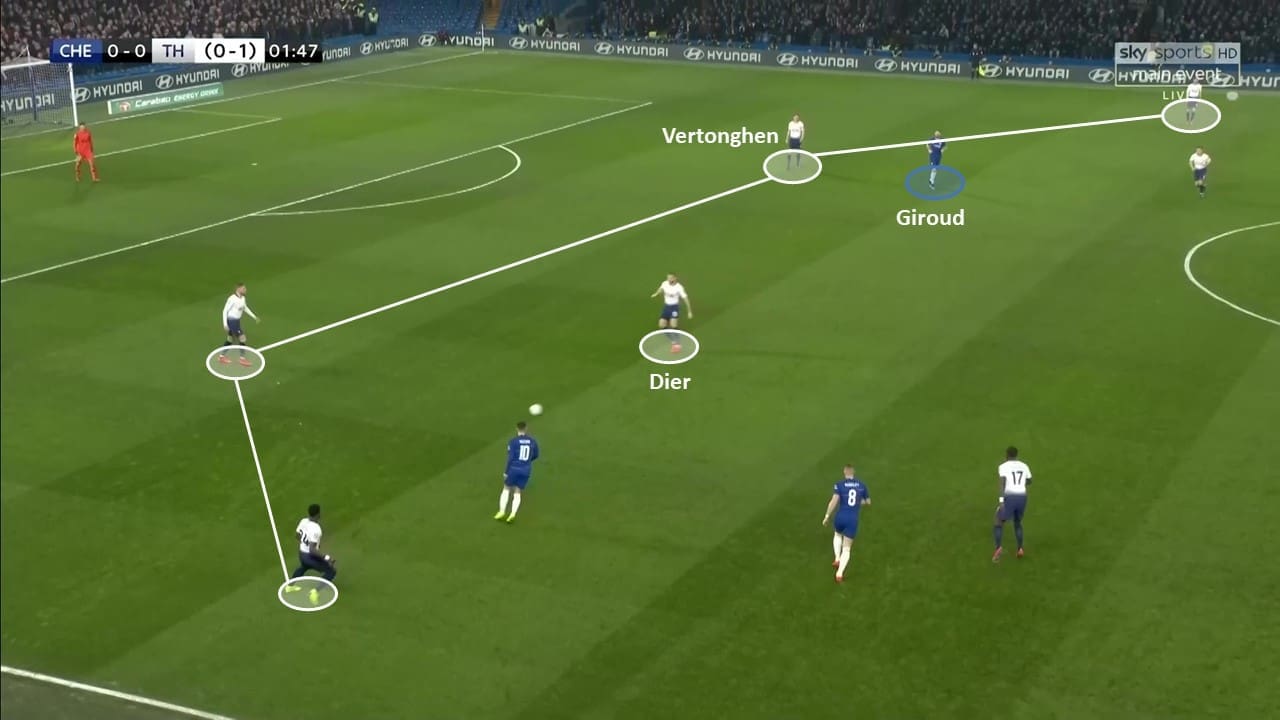
But there is a weakness in Spurs’ build-up play that has been exposed by both Wolves and Manchester United in recent weeks. When both the left-back and right-back push up the pitch, they tend to do so in tandem, simultaneously opening space on both flanks for Spurs’ opponents to expose should they win the ball back.
Sarri’s Chelsea cleverly deployed Olivier Giroud to stand on Jan Vertonghen’s side of the Spurs’ backline. With Hazard being watched by either Aurier or Sissoko, Chelsea’s Pedro and Azpilicueta were free to attack the wide space on Chelsea’s right wing when Ben Davies pushed forward.
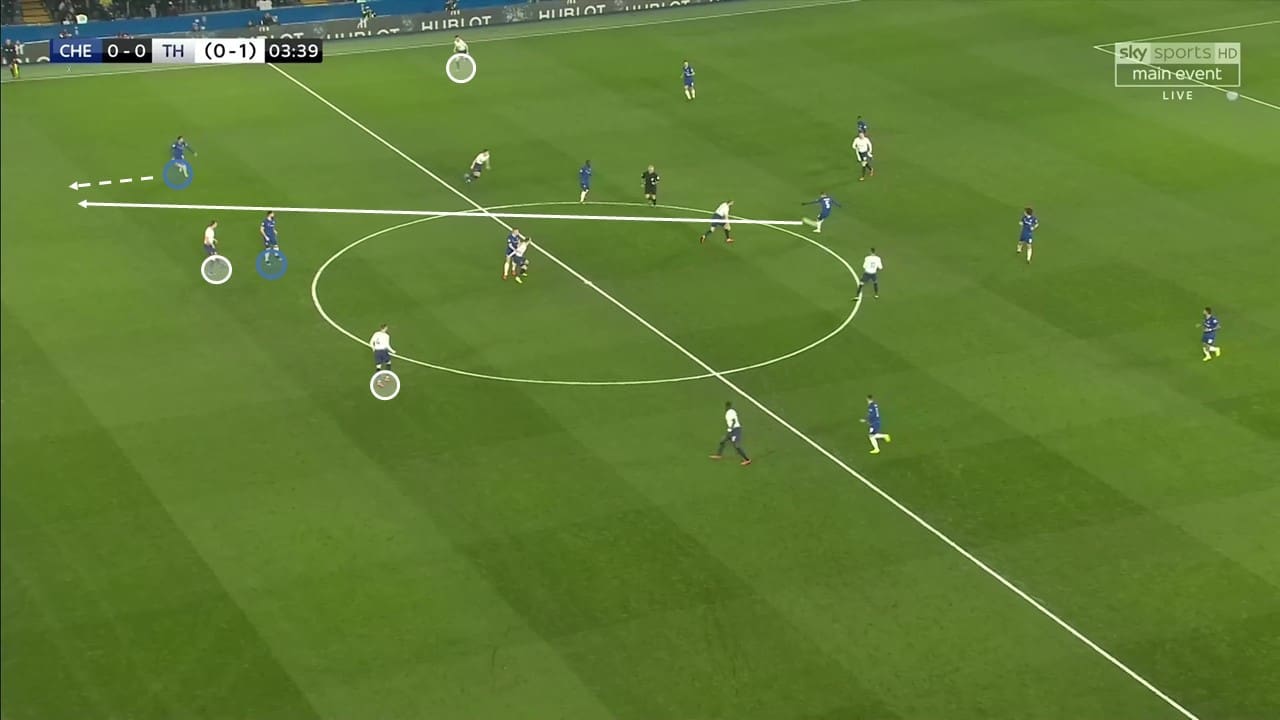
Chelsea had the better of the chances in the opening 20 minutes or so but neither side had crafted any major opportunities to score. Because of Spurs’ slow build-up and Chelsea’s clever counter-attacks, most of the play was occurring in the away side’s half of the pitch. On the occasion that Spurs did get the ball into their forwards, the effects of their missing attacking options began to show.
Usually, Mauricio Pochettino can deploy a front two consisting of Kane, Alli or Son. All three look to make forward runs beyond the opposition’s defence when the opportunity arises. But with all three of them unavailable, Spurs had to resort to a front two of Fernando Llorente and Erik Lamela.
Lamela is a winger by trade, preferring to receive the ball in front of his marker and dribble at them. Llorente meanwhile is an old-fashioned target man, looking to compete with his marker for strength and receive the ball with his back to goal or get on the end of a cross. With Spurs’ full-backs naturally beginning their runs from defensive positions, Pochettino’s side had nobody looking to run in behind Chelsea’s high defensive line.
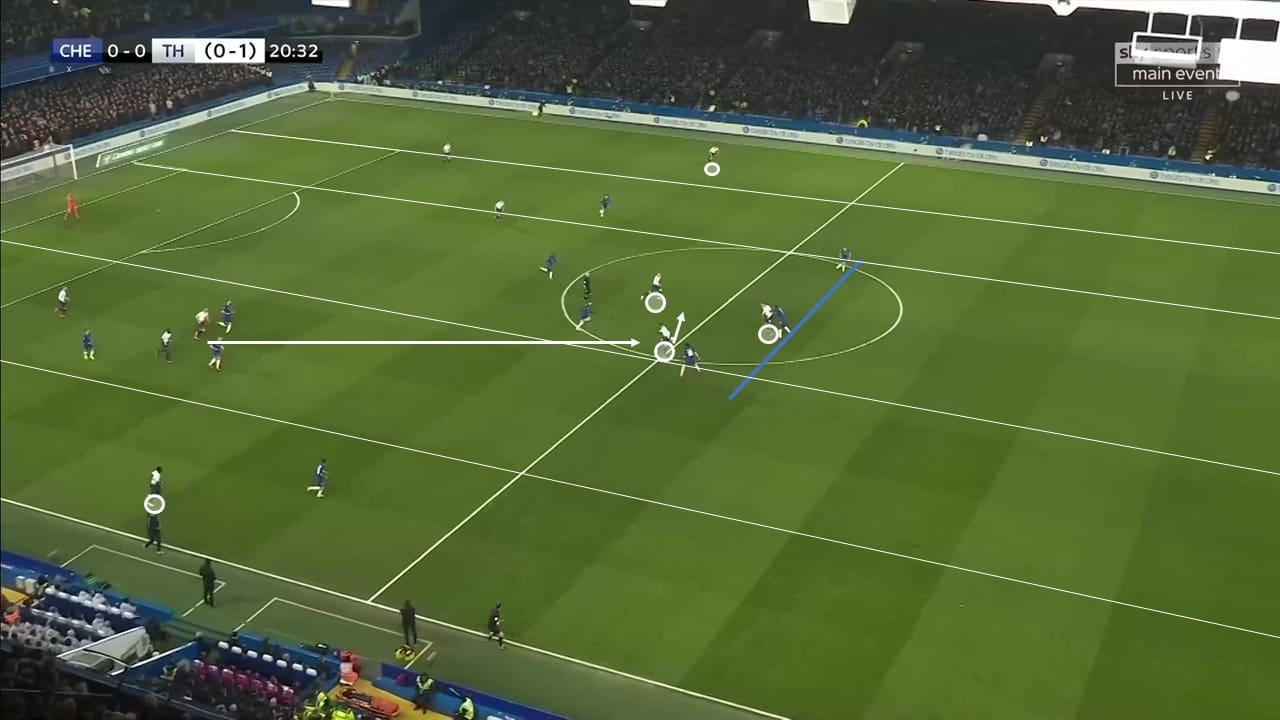
On the instances that Spurs did play the ball directly to Llorente, his first touch left a lot to be desired and Spurs found it difficult to sustain attacks. They did, however, disrupt a lot of Chelsea’s build-up play with a clever method of pressing.
Spurs would often allow a first pass at the beginning of a move, then close the Chelsea player’s available space to play in. They would only allow progression within that specific channel and would never allow more than one forward pass before aggressively closing down the man in possession. They would allow backward passes to their goalkeeper and force him to send the ball long.

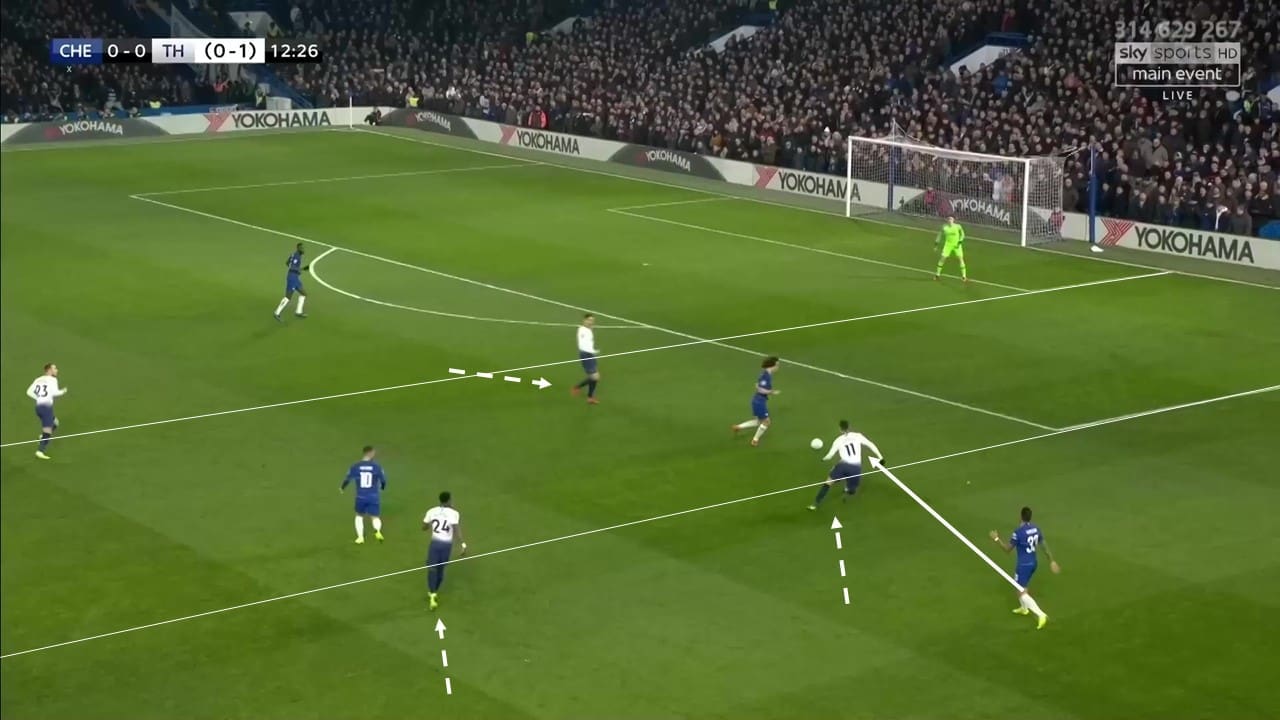
But Spurs’ lack of penetration made for mostly one-way traffic in the first half. Just before the half-hour mark, the Blues’ pressure paid off as they took control of the cup tie.
Problem? What problem?
N’Golo Kanté has won the Premier League with two separate clubs and the World Cup with France, all while playing as a defensive midfield player. Within the Sarriball system however, the preferred holding midfield type is one who is technically gifted, able to make pass after pass and ensure his side keeps possession.
While Kanté is no slouch in the passing department, his key attributes are his ball-winning abilities and his tireless engine added to an incredible knack of knowing how to shut down his opposition’s midfield. Mauricio Sarri, therefore, plays Kanté in a more advanced midfield role, where he is free to press high up the pitch and join in the attack.
Kanté’s form has subsequently dropped from past heights, but ironically it was the Frenchman who opened the scoring. After an Eden Hazard corner was cleared to the edge of the box, Kanté was on hand to smash a low driven shot which deflected off Moussa Sissoko before going through Paulo Gazzaniga’s legs.
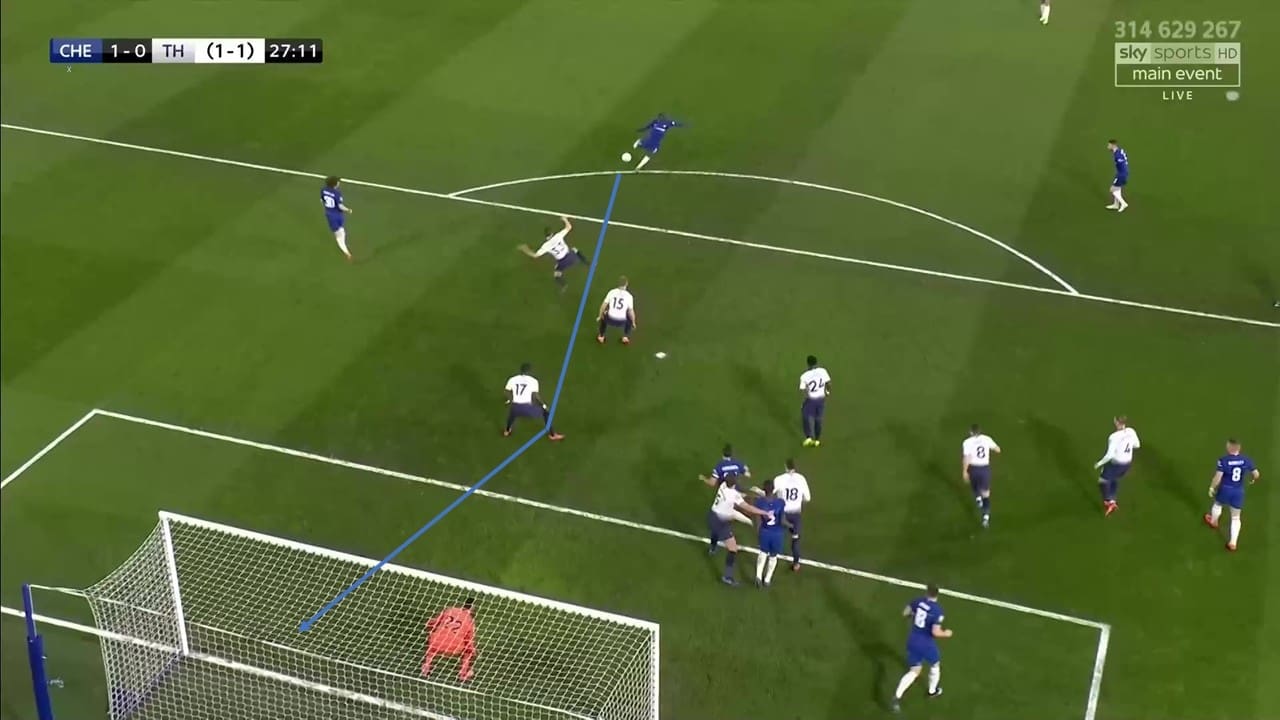
Another man reportedly unhappy with the Sarriball role he’s been given lately is Eden Hazard. The Belgian is one of the best wingers in the world on his day but in recent games has been asked to play as a central striker. The role has seen Hazard get less time on the ball and often receive it in crowded areas with his back to goal.
On this occasion, he found himself back in his favoured spot on the left wing. Spurs watched him closely in the first half hour or so, with Moussa Sissoko and Serge Aurier seemingly responsible for shackling the Belgian winger.
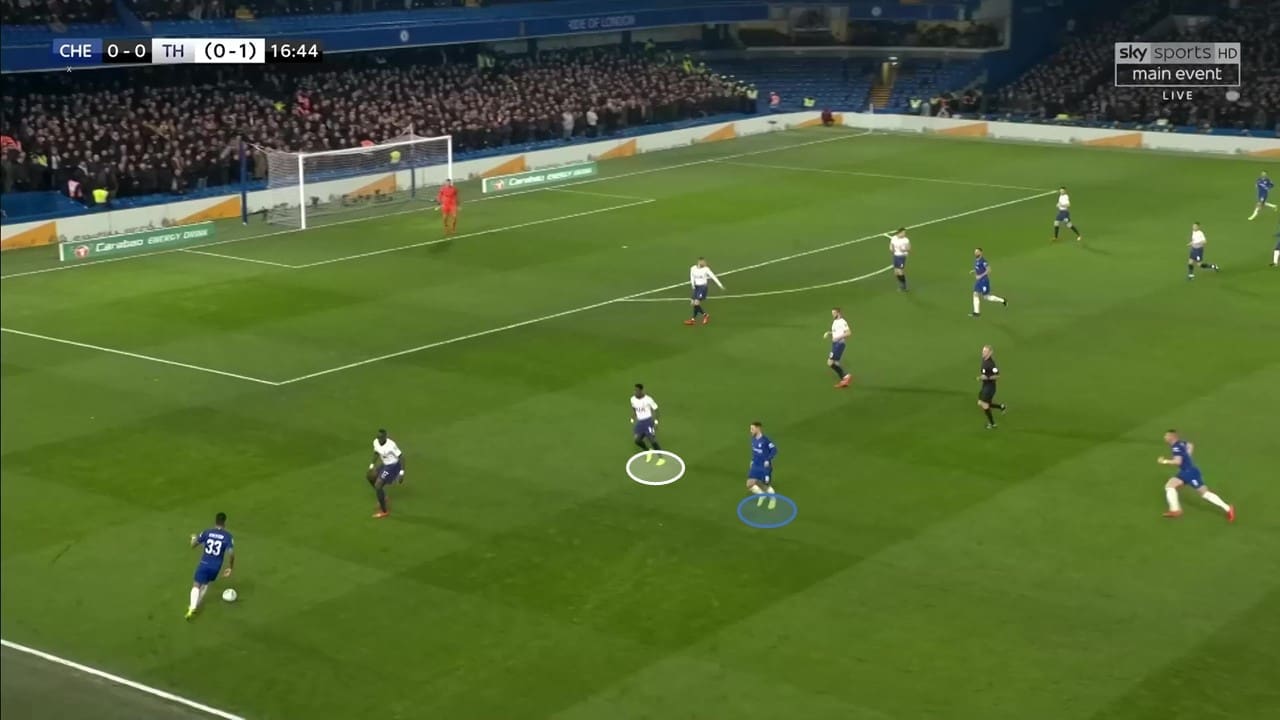
With Hazard seemingly been given a more free-roaming role in this match though, he began to find pockets of space to terrorise the Spurs defence. Following a quick free-kick from Ross Barkley, Hazard picks the ball up infield, avoiding the attention of both Sissoko and Aurier. With Azpilicueta joining in the attack from right-back, Chelsea quickly had a 5v5 situation going forward and would grab their second goal of the night.
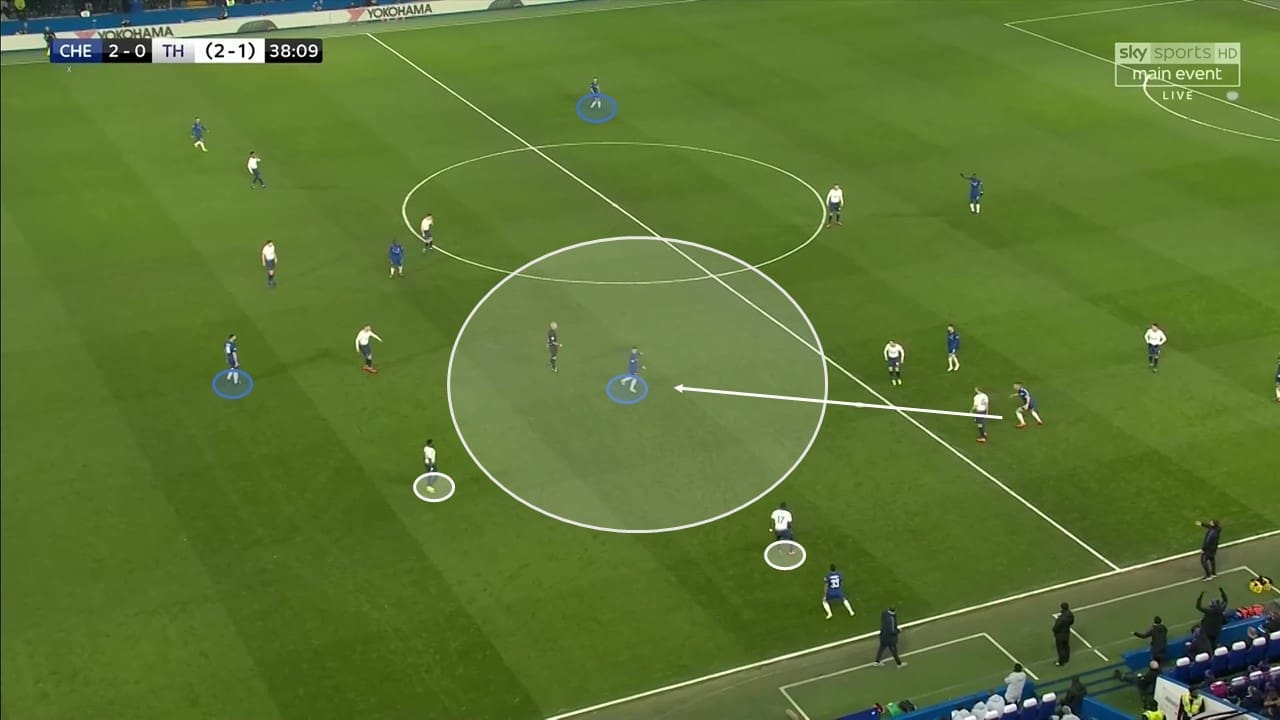
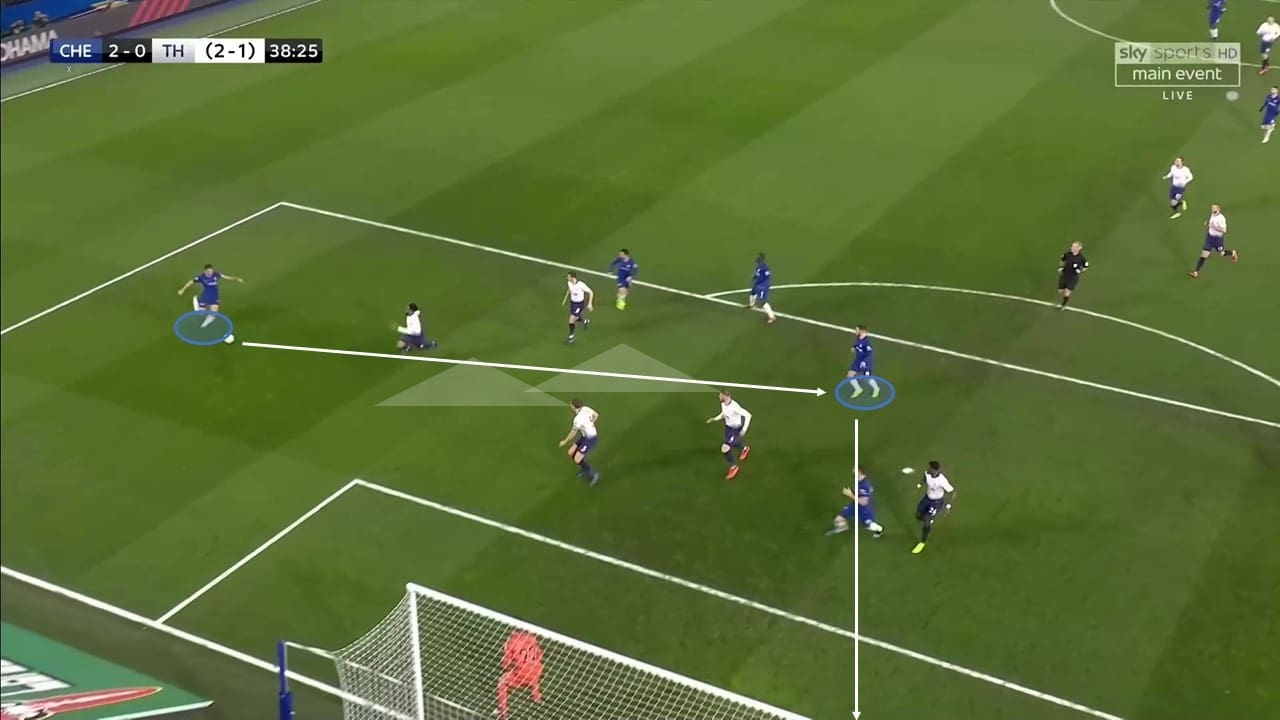
Hazard was the dangerman, constantly picking at the gaps when the Spurs defence was disorganised and will be disappointed he only scored the one goal.
Game of two halves
You don’t get heavily linked with the Manchester United and Real Madrid jobs without having some serious tactical intelligence, and Mauricio Pochettino displayed his in the second half of the game. With a change of formation to a 3-4-3, Pochettino eliminated the open spaces beside each of their centre-backs that had plagued Spurs in the first half. The switch also allowed their full-backs to become wing-backs and establish a more advanced average position.
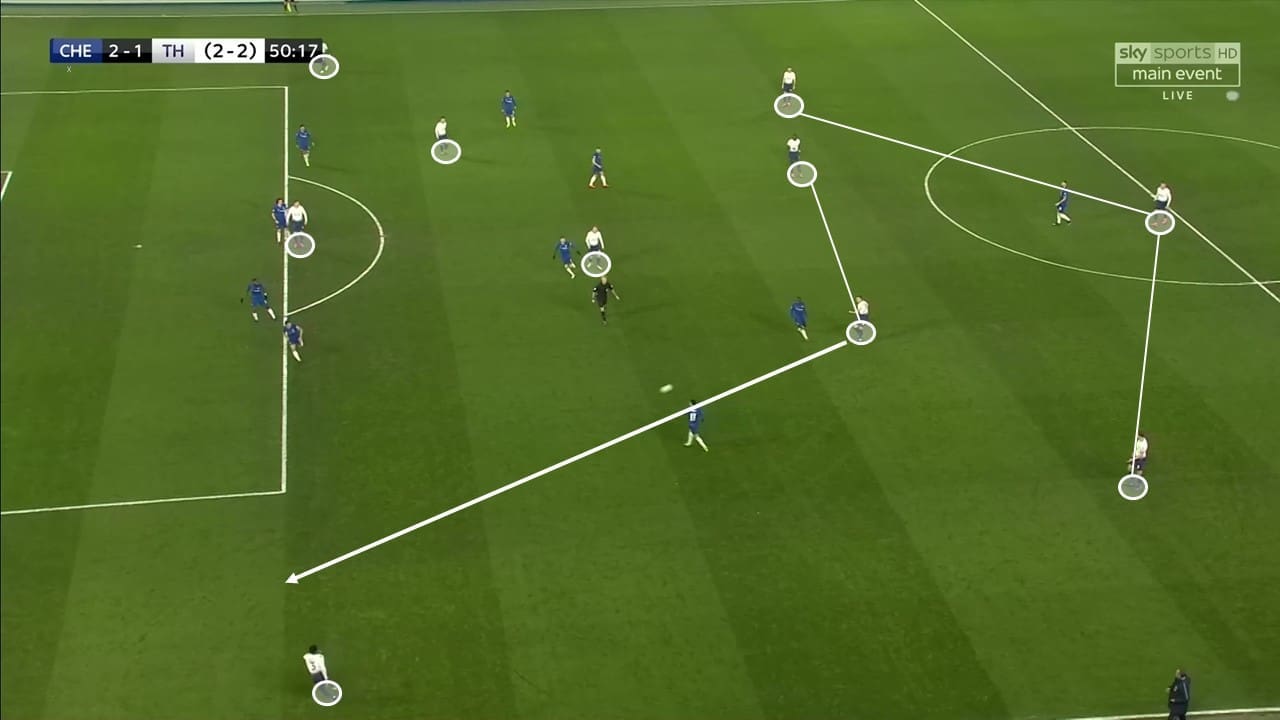
This change now tested the Chelsea backline who now essentially had a front five to contend with, as well as the loss of their favoured outlet option from the first half. Danny Rose, in particular, was getting a lot of joy down Spurs’ left flank. In the 50th minute, he crossed for Fernando Llorente to head home Spurs’ aggregate equaliser.
Spurs even began to use their forward players’ strengths to their advantage. Lamela was told to use his pace to run beyond the Chelsea backline, while Llorente became the target man, often beating David Luiz aerially to take long passes under control and supply Eriksen with the ball.
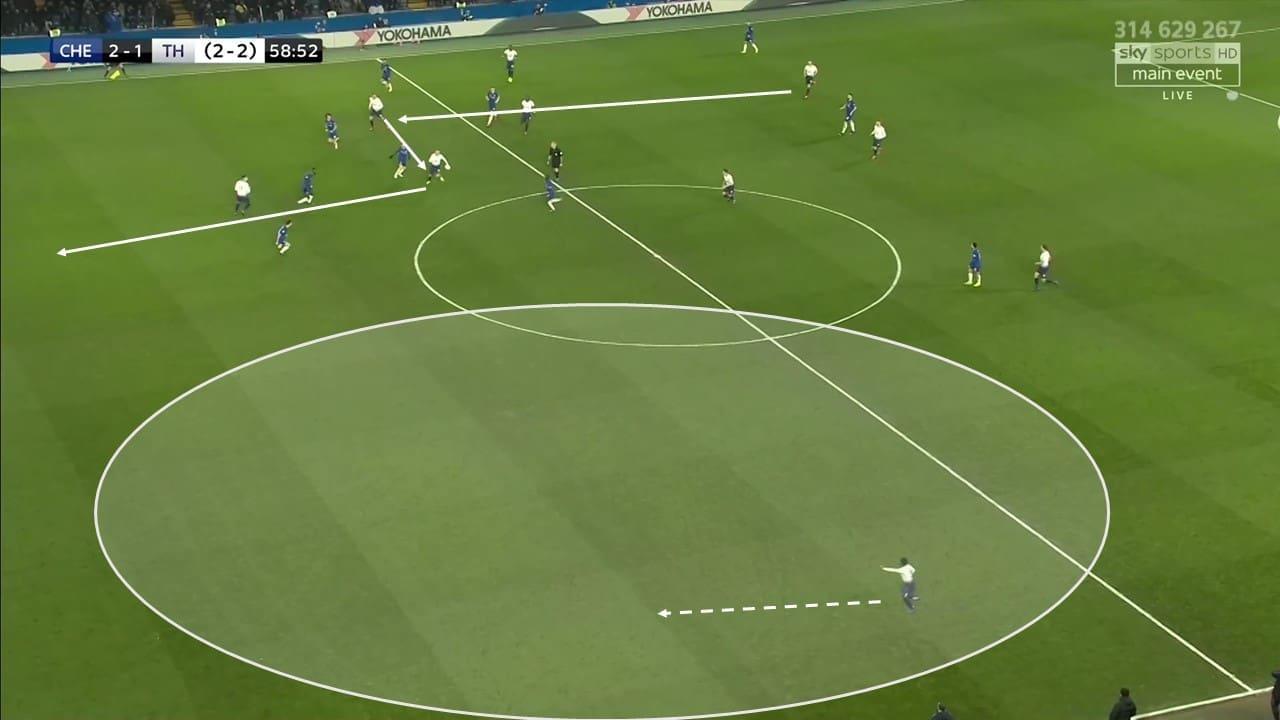
Spurs soon made another change, bringing on the pacy Lucas Moura to partner Lamela in attack in place of Llorente and go for speed over power to disrupt Chelsea. The energetic forward line would ‘back-press’ (pressing the ball from behind the ball carrier) the Chelsea midfield and stifle much of the home side’s patient build-up play.
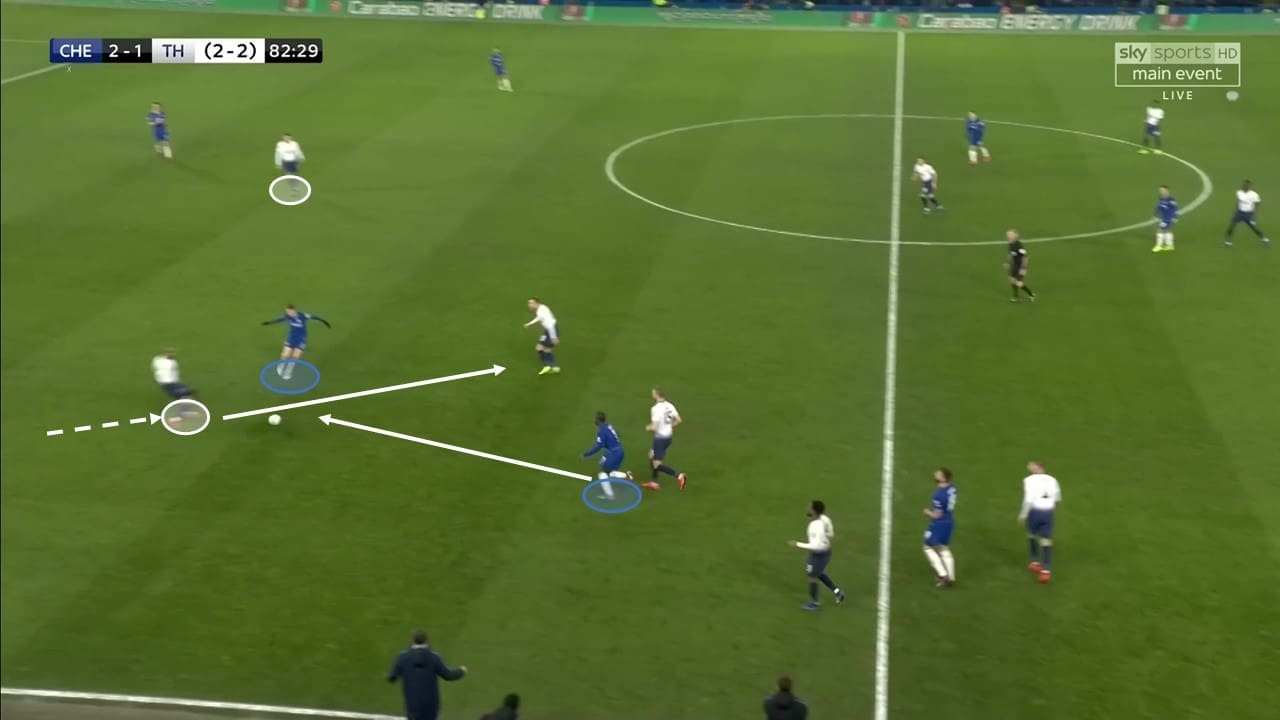
But neither side could establish control in the closing minutes as the game became cagier, each side afraid to throw it all away so close to the end. This semi-final was ultimately decided by a penalty shoot-out, which Chelsea won. The home side tucked away all four of their spot-kicks while Spurs missed their third and saw their fourth saved by Kepa Arizzabalaga, having scored their opening two
Conclusion
Maurizio Sarri and his team looked perfectly harmonious as their tactical plan came to fruition in the first half. Eden Hazard was the main man, as he’s been on many a previous occasion. His positioning and top-class finishing punished a disorganised Tottenham, and the Belgian should have had more. Chelsea will now head to Wembley on 24 February to play Manchester City in the EFL Cup Final, a tantalizing fixture to await.
Next up, another home cup tie awaits the possibly resurgent Blues after a tough few weeks, as they host Sheffield Wednesday in the FA Cup fourth-round this Sunday. The match may feature the Chelsea debut of Gonzalo Higuaín.
Mauricio Pochettino is not one to easily make excuses, but he will surely have been ruing the missing forwards while watching that first half unfold. Credit to his tactical nous, he found a way to get the best out of his side in the second half with a change of formation and approach.
However, this is the second successive cup semi-final that Spurs have lost and the wait for a trophy becomes little more desperate. Spurs will have to quickly shake off the disappointment if they wish to progress past Crystal Palace in their FA Cup fourth-round tie at Selhurst Park this coming Sunday.
If you love tactical analysis, then you’ll love the digital magazines from totalfootballanalysis.com – a guaranteed 100+ pages of pure tactical analysis covering topics from the Premier League, Serie A, La Liga, Bundesliga and many, many more. Buy your copy of the January issue for just ₤4.99 here, or even better sign up for a ₤50 annual membership (12 monthly issues plus the annual review) right here.

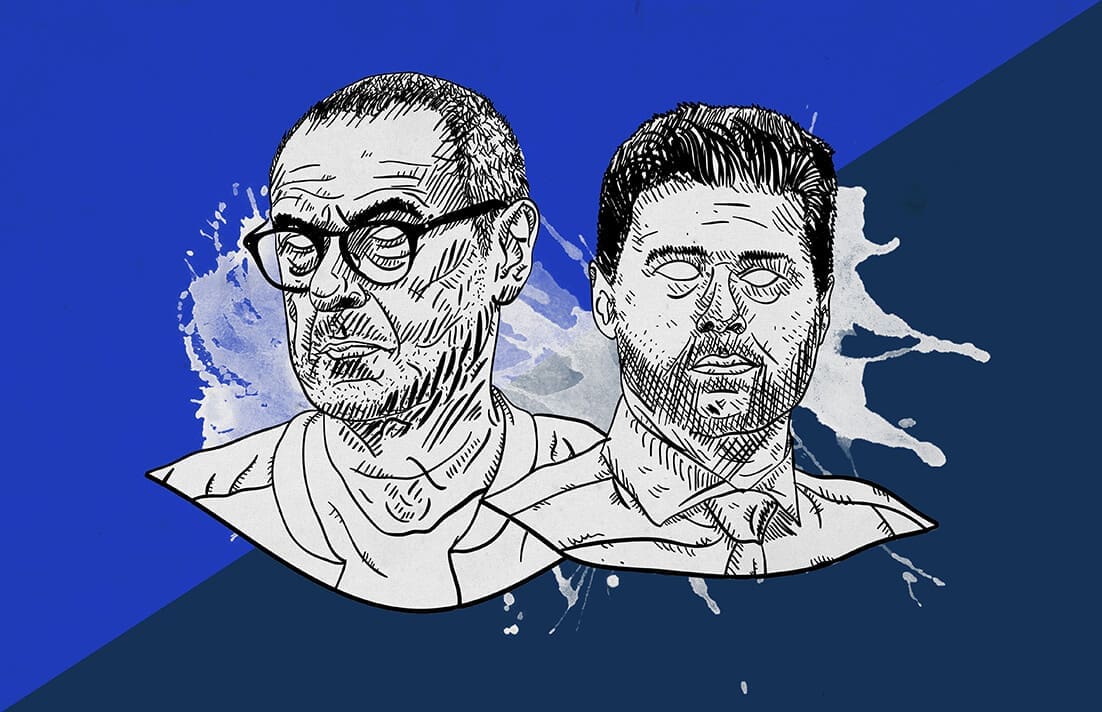



Comments